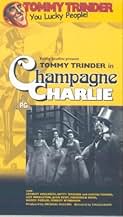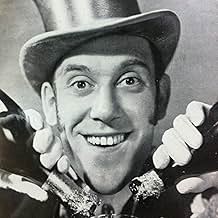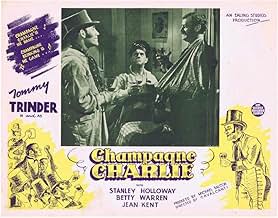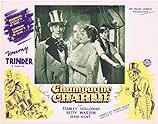The story of a 19th century English music hall performer and life behind the scenes.The story of a 19th century English music hall performer and life behind the scenes.The story of a 19th century English music hall performer and life behind the scenes.
Bill Shine
- Mogador Stage Manager
- (as Billy Shine)
Andreas Malandrinos
- Gatti
- (as Andrea Malandrinos)
Peter De Greef
- Lord Petersfield (His Son)
- (as Peter De Greeff)
- Director
- Writers
- All cast & crew
- Production, box office & more at IMDbPro
Storyline
Did you know
- TriviaFilm debut of Hazel Court, who had one line of dialogue.
- Crazy creditsOpening credits prologue: In the year of Grace 1860, two brothers set out from the mining village of Leybourne for London Town . . . .
- ConnectionsFeatured in Those British Faces: A Tribute to Stanley Holloway 1890-1982 (1993)
- SoundtracksThe Man on the Flying Trapeze
(uncredited)
Music by Alfred Lee
Lyrics by George Leybourne
Arranged by Ernest Irving
Featured review
Nostalgia is everything it's cracked up to be in Champagne Charlie, a valentine from Ealing Studios and Alberto Cavalcanti to English music halls. Ostensibly, it's the story of George Leybourne (Tommy Trinder) and his rivalry with Alfred Vance, the Great Vance (Stanley Holloway), in the music halls of mid-Victorian England. The music halls hadn't yet become the more respectable theaters of England, from which they lasted in full glory until television appeared. In the 1860s they usually were big ale houses, unsophisticated drinking and singing establishments for the working man and his lady. In this movie's view, they were often rambunctious, loud, jolly and great fun, where the swells often showed up to see the latest entertainment, which included young dancers, and everyone joined in the songs. There's a smattering of a plot beyond the rivalry (which includes a ludicrous duel at one point between the equally nervous Leybourne and Vance) involving attempts to close the music halls down and a romance between a duke's son and the daughter of Bessie Bellwood (Betty Warren), a music hall owner and singer who employs Leybourne.
The interest is in the the story of Leybourne, who becomes Champagne Charlie. He's played with enthusiasm and great cheer by Tommy Trinder, who was a hugely popular stage and later radio entertainer in the Thirties, Forties and Fifties. Trinder was a tall Cockney with a long face, round eyes, a lot of teeth and personality to spare. The first 50 minutes of the movie, in fact, is largely Trinder and Holloway performing song after song in the gas-lit music halls, always strutting their best stuff as they try to out-perform each other with drinking songs and stage power. It's a grand show, with the ale flowing, the smoky atmosphere, crowds of warm bodies having a great time...it's good cheer all around even with the plot. Hearing and seeing Trinder prance about performing Champagne Charlie; Hit Him on the Boko; Ale Old Ale; Burgundy, Claret and Port; I'm One of the Brandy and Seltzer Boys; and Everything Will Be Lovely...or hearing and seeing Holloway sell Strolling in the Park; I Do Like a Little Drop of Gin; Rum, Rum, Rum; A Glass of Sherry Wine; and Hunting After Dark...is to wish you were back there, too, downing a pint and singing with them.
If it had been possible in war-time Britain for this movie to have been made in Technicolor, Champagne Charlie would not be the forgotten museum piece it has become. The settings in the music halls cry out for lush color. For those who love English music halls, try Lost Empires. It's a multi-part TV miniseries from 1986 based on the novel by J. B. Priestly. It tells the story of Richard Herndon, played by Colin Firth, who joins his uncle for a year of touring on the Empire music hall circuit before WWI starts. Lawrence Olivier in his next to last theatrical appearance plays an aging song-and-dance man long past his prime. Lost Empires is a fine drama which expertly recreates the atmosphere and the acts.
The interest is in the the story of Leybourne, who becomes Champagne Charlie. He's played with enthusiasm and great cheer by Tommy Trinder, who was a hugely popular stage and later radio entertainer in the Thirties, Forties and Fifties. Trinder was a tall Cockney with a long face, round eyes, a lot of teeth and personality to spare. The first 50 minutes of the movie, in fact, is largely Trinder and Holloway performing song after song in the gas-lit music halls, always strutting their best stuff as they try to out-perform each other with drinking songs and stage power. It's a grand show, with the ale flowing, the smoky atmosphere, crowds of warm bodies having a great time...it's good cheer all around even with the plot. Hearing and seeing Trinder prance about performing Champagne Charlie; Hit Him on the Boko; Ale Old Ale; Burgundy, Claret and Port; I'm One of the Brandy and Seltzer Boys; and Everything Will Be Lovely...or hearing and seeing Holloway sell Strolling in the Park; I Do Like a Little Drop of Gin; Rum, Rum, Rum; A Glass of Sherry Wine; and Hunting After Dark...is to wish you were back there, too, downing a pint and singing with them.
If it had been possible in war-time Britain for this movie to have been made in Technicolor, Champagne Charlie would not be the forgotten museum piece it has become. The settings in the music halls cry out for lush color. For those who love English music halls, try Lost Empires. It's a multi-part TV miniseries from 1986 based on the novel by J. B. Priestly. It tells the story of Richard Herndon, played by Colin Firth, who joins his uncle for a year of touring on the Empire music hall circuit before WWI starts. Lawrence Olivier in his next to last theatrical appearance plays an aging song-and-dance man long past his prime. Lost Empires is a fine drama which expertly recreates the atmosphere and the acts.
Details
- Runtime1 hour 12 minutes
- Color
- Aspect ratio
- 1.37 : 1
Contribute to this page
Suggest an edit or add missing content





























